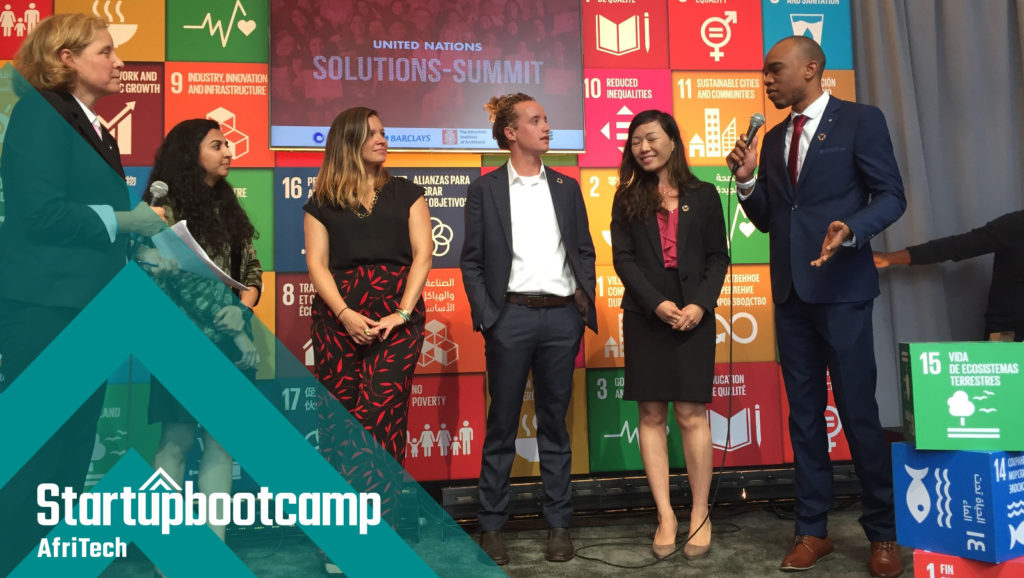We all have them. Those apps we open without thinking. Not because we need anything in particular, but because they feel… safe, in some…
How SBC is helping drive Innovation 3.0 to advance the UN’s SDG [Sponsored]

Given Africa’s inherited inequalities from the past, it has become more urgent now than ever, for governments to collaborate with institutions of education, corporates, accelerators and incubators and various other organisations — if the continent is to accelerate the implementation of the UN’s Sustainable Development Goals and innovate with a purpose.
The UN recently hosted its 73rd General Assembly. Over a week in July, various heads of state, ministers, heads of governance organisations, civil society and the private sector set foot in New York, the home of the UN to discuss various critical issues affecting sustainable development.
These were largely centred around the 17 Sustainable Development Goals for Agenda 2030 which have been adopted by 193 member states of the UN.
The then UN Secretary General Ban Ki Moon, called Agenda 2030 a “roadmap to ending global poverty, building a life of dignity for all and leaving no one behind”.
To monitor the progress in advancing the Sustainable Development Goals, 193 targets were identified to assist in defining the problem areas in light of each SDG. These targets have been specifically specialised for each global goal and allow for cross redress across the global goals.
73rd UN General Assembly
Startupbootcamp AfriTech (SBC) was privileged to be invited to the 73rd UN General Assembly as an advocate for the global goals on the African continent.
In championing Global Goal 11 (Sustainable Goals and Cities) and 17 (Partnerships for the Goals), SBC has created partnerships across the continent to facilitate the realisation of all global goals — by connecting solution makers with corporates, innovation ecosystems, thought leaders, investors and mentors.
This has been truly evident in its reach, to over 1800 startups and over 300 physical engagements and introductions of startups to partners across the continent.
SBC is driving an ecosystem of open innovation. Creating a safe space where startups and corporates can engage in developing innovative solutions for the radical implementation of the global goals. Through this, SBC specialises in finding solutions that are innovatively addressing the global goals.
This focus, of innovating to address global goals, powers the Fourth Industrial Revolution to drive innovation with purpose.
Open innovation ecosystems are at the core of driving global goals.
Marrying innovation and the global goals, opens for the wave of Innovation 3.0, facilitating a sustainable and effective knowledge sharing digital economy, where resources are decentralised and individuals are just as much empowered to be change makers and effectors of the global goals in the physical and digital realms.
Collaboration with UN Foundation and shift7
Together with the UN Foundation, SBC took part in the UN Solutions Summit, where purpose-driven innovators from across the globe, presented solutions at the UN General Assembly. These solutions sought to advance the rate of implementation and achievement of the global goals.
Such a partnership is truly vital as it marries governance structures, innovation ecosystems and startup companies and allows for the flow and effective development of innovation; from individuals to key stakeholders who can scale these solutions.
Through rigorously advancing corporate startup collaboration, SBC has identified that corporates and large organisations are great at execution, while startups are great at problem identification and solution development.
This collaboration and partnership not only benefits startups, but large corporates and organisations for effective innovation and advancement of the global goals.
Working with SAP Next-Gen and WEF
Together with SAP Next-Gen, the World Economic Forum and the World Bank, SBC partnered to advance African solutions addressing various water challenges at an international scale.
The challenge saw a plethora of solutions that identified problems which were previously not considered as issues to be urgently addressed by the World Bank and the World Economic Forum.
This foresaw a realignment in vision and focus on water challenges but further informed the World Bank and the World Economic Forum on new technologies that are emerging to address these newly identified challenges.
This partnership further saw the innovation ecosystem, the startup ecosystem, bodies of governance and corporates partnering to share knowledge and resources in the digital economy for the effect of Global Goal 6 — Clean water and Sanitation.
Young digital talent
Partnering with young innovators — be it by regulators, large corporates or organisations — is more than a two-folded solution. It addresses education, employment as well as empowers innovative solutions to address the global goals for the fourth industrial revolution.
This is a goal which various institutions, corporates and organisations, besides government, can champion, advocate and take ownership for. With a projected population of 840-million youth on the African continent by 2050, governments and large organisations should now more than ever, partner with young innovators and more so take ownership of their development.
In the first quarter of 2019, Startupbootcamp AfriTech will be launching The Talent Institute to address Global Goal 4: Quality Education and Global Goal 8:Decent work and Economic Growth.
The Talent Institute will create a direct pipeline that equips Young Talent with skills for the digital economy. This will empower them with entrepreneurial skills, digital skills and hands to think and work innovatively.
The Talent Institute will achieve this by partnering with universities, large corporates and government. The young innovators and talent will, on completion of the six-month programme, be placed at the helm of corporates for employment or empowered to startup their own venture.
Corporates, as well as governments, will further have direct access to young innovative talent to drive Innovation 3.0.
Africa and the future of cross-border collaboration
Such collaborations and partnerships for the continent, are only viable with strong institutions and regulations that allow for free trade. This precipitated the call for the African Continental Free Trade Area, in light of Agenda 2063 of the AU commission.
The free trade area agreement, which was signed on 21 March by 55 African countries, foresees a trade area with a GDP of over $3-trillion. The agreement received an extensive focus at the 73rd UN General Assembly, where heads of states and ministers from various African countries, extensively discussed the effect and applicability of the agreement.
A free trade area will address the anomaly where African countries trade less with each other and will foster for an environment where there’s more increased trade within the country.
This agreement will cover, competition policy, intellectual property rights and investment facilitation across the continent. On conversations with the AU Commissioner for Trade and Industry Albert Muchang who highlighted that there is roughly 60% of cross-border couriers within the EU in comparison to 16% in the AU.
The continental free trade area will find ways to identify such inconsistencies of trade in the continent and optimistically create a true open innovation ecosystem allowing for the trade of IP.
It will also allow for a healthy competitive environment for trade and knowledge sharing to drive innovation 3.0, to drive African Innovation and reshape the African narrative.
Startupbootcamp AfriTech — the leading multi-corporate backed accelerator on the African continent — is creating open innovation ecosystems to further Innovation 3.0, connecting innovative and sustainable solutions with our network of corporates.
SBC is continuously looking for partners to collaborate with, in advancing the global goals and advance Innovation 3.0. If you are looking to partner with us to impact the African ecosystem and change the African narrative, contact us on cape.town@startupbootcamp.org.
This piece was authored by Motlhabane Koloi, the legal manager and project lead for Sustainable Development Goals for Startupbootcamp AfriTech. The piece first appeared on SBC’s blog — see it here.
Koloi was this year invited to attend the 73rd UNGA High-Level Side Event on Social Business, Youth and Technology: Innovate together to Achieve the Sustainable Development Goals.
He further was invited to the High-Level Breakfast Meeting on “Enhancing global partnerships for IDDA III — Key for successful implementation of the African Continental Free Trade Area (AfCFTA)” hosted at the 73rd UN General Assembly.
This article was sponsored by Startupbootcamp AfriTech.


